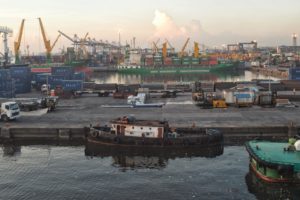
The Philippine Competition Commission (PCC) recommends the amendment of a policy granting pioneer status in domestic shipping, noting it hinders healthy competition by discouraging the entry of new players.
The PCC is referring to Executive Order (EO) No. 909 and its implementing order, Maritime Industry Authority (MARINA) Circular 2015-04, which seek to modernize the domestic fleet through the introduction of new vessels.
The EO introduces incentives that “distort the market and pose additional regulatory restrictions that hinder entry and expansion activities,” said PCC in a policy note entitled “On Potential Competition Concerns in the Granting of Pioneer Status in the Philippine Shipping Industry.”
EO 909, issued in 2010, encourages investments in newly constructed ships or brand-new vessels in the domestic shipping industry by providing incentives, which only became available when the implementing order, MC 2015-04, was issued in 2015.
While the EO 909 mainly aspires to resolve industry inefficiencies related to safety, “it might have certain effects on market dynamics that need to be examined to determine whether competition is harmed as a consequence of the intervention,” according to the policy note.
The provisions of EO 909 serve to act as regulatory barriers that impose bans on entry and expansion activities, allow participation of incumbent players in entry decisions, and increase compliance costs, said policy note authors Genevieve E. Jusi, Janine P. De Vera, and Vincent Jerald R. Ramos.
EO 909 provides that new and existing domestic shipowners or operators who will introduce International Association of Classification Societies (IACS)-classed brand-new or newly constructed ships in their respective authorized or applied routes may be granted “pioneer status.” The status entitles them to a set of benefits and privileges to ensure recovery of their investments.
But IACS-classed vessels are more expensive than non-IACS classed brand-new or secondhand vessels, both in purchase price and maintenance costs, the policy note observed.
Moreover, shipbuilding material and equipment for IACS-classed vessels cost 30% to 50% more than non-IACS-classed alternatives, industry players claimed.
Steep cost of investment
As vessel cost is the most significant expense for a shipowner who wants to obtain a pioneer status, the high cost of investing in a brand-new and IACS-classed vessel makes it harder for potential competitors to enter the market and for incumbent players to expand in their own routes.
At the same time, ships intended only for coastwise voyages may not actually need IACS classification as this is mostly applied to vessels plying international waters, industry stakeholders said.
Additionally, the provision of brand-new vessels or international classification does not automatically guarantee safety. Rather than age, vessel maintenance is argued to be the more critical factor.
Therefore the condition of introducing IACS-classed vessels may be unnecessary and only prevents ship operators from effectively servicing routes that already have existing pioneer status operators, the policy note pointed out.
Under the policy, pioneer status grantees are given the opportunity to impede entry through the right of first refusal. In case additional vessels need to be deployed, pioneer status grantees are given first priority to add new vessels and/or schedules.
“Thus, in routes where there are existing players, expansion activities of incumbents are curtailed as they will only be allowed to add trip frequencies or vessels if the pioneer status grantee is unable to do so. This limits the incumbent players’ ability to provide a wider range of services to passengers or cargo customers,” the policy note explained.
However, in routes with no pioneer status grantees and incumbents cannot add IACS-classed vessels, an entity may enter a route even without having a brand-new and IACS-classed vessel, but the new entrant would not have access to the incentives under EO 909.
As of December 2018, only six companies have benefitted from the pioneer status program.
An oligopolistic environment
Once pioneer status is granted to a ship operator in its authorized route, entry and expansion becomes more difficult for potential entrants as well as incumbent players, the policy note said.
“In oligopolistic environments such as the domestic shipping industry, threat of entry is expected to be a major disciplining force to incumbent players. Participation of new and efficient competitors would correct the behavior of existing operators by introducing competitive pressure to provide higher quality and lower priced services,” the policy note stated.
The authors said that while vessel modernization is important, “improvements that need to be made to the Circular to ensure that market competition is not negatively affected as a consequence of attaining these policy objectives.”
There is a need to evaluate and determine whether there are other measures that MARINA can impose to guarantee quality and safety of domestic shipping services without requiring shipping lines to make investments that significantly raise their operating costs and thus affect their ability to compete effectively, the policy note said.
There may also be alternative means to ensure quality and safety without imposing restrictive conditions on entry activities.
Moreover, based on market investigation, the special ramp or berthing facility provided to certain pioneer status players gives an advantage to these operators because the facilities cannot be accessed by any other competitor.
The policy note pointed out that access to port facilities should be available for all shipping lines operating in the same route and as such, there is a need to re-evaluate whether this specific provision or incentive is necessary.
“The provision may only be benefiting a certain group of shipping lines and putting other competitors at a disadvantage,” it said.
It recommends that MARINA continue its existing efforts with various government agencies to periodically review and, if needed, amend specific provisions of the policy.
It added that PCC, which is mandated to promote fair market competition, “should continue coordinating closely with MARINA to perform its advisory functions and flag any potential competition concerns in the planned policies and programs for the Philippine shipping industry.”
Further, industry stakeholders’ proactive participation in public consultations will help ensure a fair policy design. – Roumina Pablo





